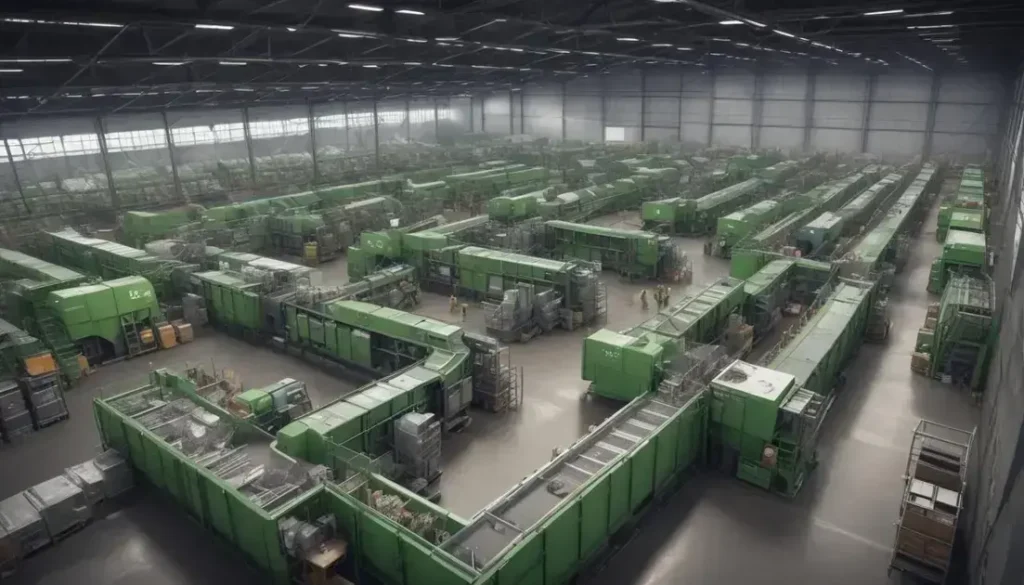Australian suppliers face challenges such as stringent sustainability regulations, increased consumer demands for transparency, and global supply chain disruptions, all of which require strategic adaptations to maintain competitiveness and compliance in the market.
Sustainability is at the forefront of global discussions, shaping how businesses operate. In an event like Sustainability LIVE Chicago, key insights are shared on the future of procurement and sustainability, influencing Australian suppliers significantly. Are you ready to explore these dynamics?
Introduction to Sustainability LIVE Chicago
Sustainability LIVE Chicago brings together industry leaders to share insights on implementing sustainable practices in business. This event creates a platform where various stakeholders can discuss the latest trends and innovations in sustainability. It serves as a vital connector between theoretical knowledge and practical applications, showcasing how businesses can adapt to changing consumer demands.
Participants can expect to learn about the role of corporate responsibility in shaping market strategies. Collaboration between different sectors enhances the drive towards sustainable solutions. Executives share their experiences, emphasizing the importance of integrating sustainability into long-term goals.
Workshops and panel discussions offer hands-on strategies for tackling common barriers in sustainability. These sessions encourage networking, allowing attendees to form partnerships that can lead to impactful projects. By engaging with sustainability experts and practitioners, businesses can leverage their insights to improve their own practices.
The event also highlights regulatory changes affecting sustainability initiatives. Awareness of these developments helps businesses stay compliant while fostering innovation. Ultimately, Sustainability LIVE Chicago aims to empower attendees with the knowledge and tools necessary to drive transformation in their organisations and industries.
Role of Executives in Sustainability
The role of executives in sustainability is crucial for driving meaningful change within organisations. Leaders are responsible for shaping the vision and strategy that prioritises sustainable practices. Their commitment is essential in fostering a culture that values environmental stewardship and social responsibility.
Executives must actively engage in discussions about sustainability goals and integrate them into the overall business strategy. By doing so, they can ensure that sustainability becomes a core component of operational practices. This strategic inclusion supports long-term growth and enhances competitive advantage in an increasingly eco-conscious market.
Moreover, executives are tasked with mobilising resources to implement sustainable initiatives effectively. This involves investing in innovative technologies and processes that reduce environmental impact. Strong leadership helps to allocate the necessary funds and support for sustainability projects, fostering a sense of ownership across the organisation.
Collaboration is another vital aspect of an executive’s role. They should work closely with teams across all levels, encouraging open communication and knowledge sharing about sustainability practices. By leading by example, executives can inspire employees to adopt sustainable behaviours in their daily work, driving collective impact within the organisation.
Kathy Presto and the Procurement Panel
Kathy Presto’s role in the procurement panel at Sustainability LIVE Chicago highlights the intersection of sustainability and effective sourcing strategies. As a leader in sustainable procurement, she drives conversations that emphasise the importance of ethical sourcing practices in today’s market.
During the panel, Kathy discusses how organisations can align their procurement processes with sustainability goals. This involves evaluating suppliers not only on cost but also on their environmental and social impact. Such an approach ensures that sourcing decisions contribute positively to the community and the planet.
Furthermore, Kathy underscores the necessity of collaboration between procurement teams and other departments. By engaging stakeholders across the organisation, procurement can influence broader sustainability initiatives and enhance overall corporate responsibility. This integrated approach fosters a culture focused on sharing best practices and driving collective results.
Throughout the discussions, attendees gain insights into the latest trends and tools available for sustainable procurement. Kathy encourages participants to adopt innovative technologies that streamline sourcing and promote transparency in the supply chain. Her insights inspire procurement professionals to take actionable steps towards creating a more sustainable future for their organisations.
Key Takeaways for Procurement and Supply Chain
In the dynamic landscape of procurement and supply chain management, key takeaways from events like Sustainability LIVE Chicago provide invaluable insights. Understanding these insights helps businesses enhance their sustainability strategies and operational efficiencies.
One significant takeaway is the emphasis on integrating sustainability practices into the supply chain. Organisations are encouraged to assess their supply sources and prioritise those that align with environmental goals. This shift not only improves environmental performance but also bolsters brand reputation among consumers increasingly focused on sustainable choices.
Another important point is the necessity of leveraging technology to enhance supply chain transparency. The adoption of innovative tools enables real-time tracking and monitoring of sustainability metrics. By investing in technology, companies can identify areas for improvement and ensure compliance with evolving regulations.
Collaboration across the supply chain is another essential theme. Engaging suppliers, stakeholders, and consumers fosters a more sustainable ecosystem. Companies that actively seek partnerships tend to achieve better outcomes, as aligned goals lead to shared benefits and innovations.
Lastly, ongoing education and training for teams is vital. Empowering procurement professionals with knowledge of sustainable practices equips them to make informed decisions that drive organisational success.
Impact of Legislation on Supply Chain
The impact of legislation on supply chain practices is increasingly critical in today’s business environment. Organisations must navigate complex legal frameworks that dictate environmental standards, labour practices, and ethical sourcing guidelines. Understanding these regulations can greatly influence how companies operate within their supply chains.
New laws aimed at enhancing sustainability compel companies to reassess their sourcing strategies. This often results in tighter scrutiny of suppliers to ensure compliance with environmental and social governance criteria. Failure to adhere can lead to legal repercussions and damage to a company’s reputation, making legislative awareness essential for procurement teams.
Moreover, regulations related to carbon emissions and waste management are driving shifts towards more sustainable practices. Companies are adopting innovative technologies and systems to monitor compliance, which not only mitigates risks but also enhances operational efficiency. Investing in sustainable solutions is not just about compliance; it also opens avenues for new market opportunities.
Legislation also fosters competition by establishing clear benchmarks for sustainability. This compels businesses to innovate and invest in greener technologies and practices. As companies strive to meet or exceed these benchmarks, they often discover greater efficiencies and cost savings within their supply chains.
Collaboration between Sourcing and Sustainability
Collaboration between sourcing and sustainability is vital in modern supply chain management. As companies strive to meet consumer demands for environmentally friendly products, the integration of sustainable practices into sourcing processes becomes essential. This collaboration can lead to more responsible purchasing decisions and greater overall efficiency.
Effective collaboration requires open communication and alignment of goals between sourcing teams and sustainability departments. By working together, these teams can identify suppliers who prioritise sustainability and ethical practices. This not only helps in building a transparent supply chain but also enhances the company’s reputation among consumers who value ethical sourcing.
Implementing sustainable sourcing strategies often involves conducting regular assessments of supplier practices. By sharing data and insights, sourcing and sustainability teams can pinpoint areas for improvement and collaborate on initiatives that reduce environmental impact. This proactive approach fosters innovation and can lead to the development of new products that appeal to eco-conscious consumers.
Furthermore, partnerships with suppliers that share a commitment to sustainability can enhance the resilience of the supply chain. Such alliances facilitate knowledge exchange and foster a culture of continuous improvement. The combined efforts of sourcing and sustainability teams not only benefit the environment but also contribute to the long-term success and profitability of the organisation.
Insights on Global Sustainability Trends
The landscape of global sustainability trends is evolving as companies and governments recognise the urgent need for environmentally responsible practices. Increased consumer awareness about climate change and ecological preservation significantly influences business strategies worldwide.
One prominent trend is the rise of circular economy practices, where businesses aim to minimise waste by reusing resources and materials. This approach reduces environmental impact and creates new economic opportunities. Companies adopting circular models often report enhanced brand loyalty, as consumers tend to support brands that demonstrate a genuine commitment to sustainability.
Another key trend is the integration of renewable energy sources, such as solar and wind power, into business operations. Many organisations are setting ambitious targets to become carbon-neutral, pushing for cleaner energy solutions. This shift not only benefits the environment but also can lead to substantial cost savings over time, as the reliance on fossil fuels decreases.
Additionally, there is a growing emphasis on supply chain transparency. Consumers demand to know where products come from and how they are made, leading companies to enhance sustainability disclosures and practices. This trend encourages ethical sourcing, better labour practices, and improved environmental stewardship across the supply chain.
Future of Procurement in a Sustainable World
The future of procurement in a sustainable world is rapidly changing as organisations recognise the necessity of integrating sustainability into their supply chain strategies. As businesses respond to the growing demand for environmentally responsible practices, procurement plays a pivotal role in facilitating this transition.
One significant trend is the adoption of green procurement, where organisations prioritise suppliers who demonstrate a commitment to sustainable practices. This includes evaluating products based on their environmental impact, ensuring that sourcing decisions contribute positively to climate goals. By aligning procurement policies with sustainability objectives, companies can drive significant change across their supply chains.
Furthermore, the incorporation of technology in procurement processes is set to revolutionise how organisations manage their supply chains. Digital tools and platforms enable real-time tracking and analysis of sourcing activities, promoting transparency and efficiency. This technological advancement aids businesses in making informed decisions that enhance sustainability and reduce waste.
Collaboration is also crucial in this evolving landscape. Procurement teams must work closely with various stakeholders—such as suppliers, sustainability experts, and customers—to create a unified approach towards sustainable practices. By fostering these partnerships, organisations can share knowledge and resources, paving the way for innovative solutions that benefit both business and the environment.
Challenges Australian Suppliers Face
Austrailian suppliers encounter numerous challenges in today’s rapidly evolving market. With increasing competition both locally and globally, they must continuously adapt to meet the demands of a dynamic business environment. One of the foremost challenges is the need to comply with sustainability regulations, which are becoming more stringent. Suppliers are required to implement environmentally friendly practices, which can involve significant investment and systemic changes.
Additionally, suppliers face pressure from consumers who are increasingly conscious of sustainability. They seek transparency in the sourcing and production processes of goods. This demand necessitates that suppliers invest in technology and processes that enable them to provide detailed information about their supply chains.
Another significant hurdle is the global supply chain disruptions caused by factors such as geopolitical tensions, natural disasters, and unforeseen events like the COVID-19 pandemic. These disruptions can lead to delayed shipments and increased costs, straining the relationships suppliers have with their customers.
Furthermore, the fluctuation of raw material prices can impact profitability. Suppliers must navigate the complexities of pricing strategies while trying to maintain quality and reliability in their offerings. Overcoming these challenges requires a strategic approach and a commitment to continuous improvement to stay competitive in the market.
Conclusion and Next Steps
The conclusion of the discussions at Sustainability LIVE Chicago underscores the urgency for organisations to embrace sustainable practices. The insights shared highlight the critical role of procurement and sourcing in achieving sustainability goals across various industries. It is clear that adapting to these changes is no longer optional but a necessary step for long-term viability.
Moving forward, companies should prioritise building strong collaborations across their supply chains. By working closely with suppliers and stakeholders, organisations can create a unified approach to sustainability that benefits all parties involved. Emphasising shared goals will foster mutual support and innovation in sustainable practices.
Embracing technology will also be crucial in this transition. Businesses must invest in digital tools that enhance transparency and provide real-time data on sustainability metrics. This tech-driven approach allows for more informed decision-making and efficient monitoring of progress towards sustainability targets.
Finally, continuous education and training for staff at all levels will help embed sustainability into the organisational culture. Equipping teams with the knowledge and skills to implement sustainable practices ensures that businesses remain competitive while contributing to environmental stewardship.
In Summary: Embracing Sustainability in Procurement
The journey towards sustainability is essential for businesses today. As we have seen, integrating sustainable practices into procurement and supply chain strategies is no longer a choice but a necessity for long-term success.
By building strong partnerships and leveraging technology, companies can enhance their sustainability efforts. Educating teams about sustainability further ensures that these practices are deeply embedded in the organisational culture.
Taking these steps not only aids in meeting regulatory requirements but also drives innovation and boosts brand loyalty among consumers. The future is bright for organisations that commit to sustainability.
Therefore, embracing these changes will not only benefit the environment but also position companies as leaders in their industries.
Frequently Asked Questions
What are the main challenges Australian suppliers face?
Australian suppliers encounter challenges such as tight sustainability regulations, rising consumer demands for transparency, and global supply chain disruptions.
How can businesses enhance their sustainability efforts?
Businesses can enhance sustainability by building strong collaborations with suppliers, integrating technology to improve transparency, and investing in employee education on sustainable practices.
What role does technology play in sustainable procurement?
Technology helps streamline procurement processes, enabling real-time tracking of sustainability metrics and facilitating informed decision-making.
Why is sustainability important for businesses?
Sustainability is vital as it meets consumer demand for responsible practices, complies with regulations, and fosters brand loyalty, ultimately leading to long-term success.
How can companies ensure compliance with sustainability regulations?
Companies can ensure compliance by regularly reviewing and updating their practices, conducting audits, and staying informed about new regulations and standards.
What is the impact of consumer behaviour on supply chains?
Consumer behaviour significantly impacts supply chains, as buyers increasingly prefer products from companies that demonstrate ethical sourcing and sustainable practices.


